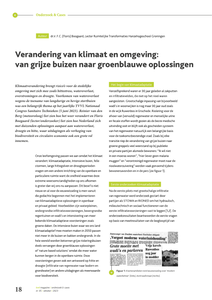Kunnen wadi’s en raingardens overal? Hoe regel je het beheer? Wat is de ecologische waarde van een wadi of raingarden? Hoe overtuig ik de gemeente? In sneltreinvaart toont Floris Boogaard (Hanzehogeschool Groningen en Deltares) honderden inspirerende voorbeelden. Hij geeft daarmee antwoord op de meest gestelde vragen over wadi’s en raingardens: het kan (bijna) overal en de woonomgeving wordt er leefbaarder van.
LINK
Bomennieuws (Reina de Smeth en Floris Boogaard), Bomen en wadi’s versterken elkaar, Bomenstichting winter 2024
LINK
De zomer van 2018 gaat de geschiedenis in als ‘de droogste zomer’ en dit zal vaker voorkomen. (Inter-)nationale overheden, kennisinstituten en adviesbureausvragen zich af of de klimaatadaptieve regenwatervoorzieningen die de laatstedecennia op veel plaatsen zijn aangelegd, de intensievere buien na deze droge perioden goed kunnen verwerken.
DOCUMENT

Klimaatadaptatie staat in Nederland hoog op de agenda en vraagt om eenandere inrichting van de openbare ruimte. Grote regenbuien passen niet inrioolbuizen dus wordt verharding vervangen door groen. Groenvoorzieningenkrijgen functies als waterberging en infiltreren regenwater in de bodem,zoals bij wadi’s (water afvoer drainage en infiltratie). Het afstromendregenwater dat infiltreert bevat verontreinigingen zoals PAK en zwaremetalen die in de toplaag van de wadi worden afgevangen. De concentratieszijn echter zo laag dat vervuiling pas na jaren meetbaar is.
DOCUMENT

Het begon als een overzichtskaartje met Nederlandse onderzoekslocaties van doorlatende verharding en wadi's. Tien jaar later is Climatescan uitgegroeid tot de grootste internationale interactieve database voor klimaatadaptatieve maatregelen.
LINK
Veel waterschappen en gemeenten vragen zich af of de regenwatervoorzieningen die de laatste decennia op veel plaatsen zijn aangelegd, op lange termijn goed functioneren en of de implementatie kosteneffectief is. Onderzoek in Almere leert dat de infiltratiecapaciteiten van wadi’s voldoende zijn om het water binnen enkele uren te verwerken. Bij doorlatende verharding wordt vaak dichtslibbing aangetoond, maar ook na enkele jaren kunnen de infiltratiecapaciteiten nog boven de ingrijpmaatstaf liggen. Bij goed ontwerp, aanleg en beheer kunnen deze regenwatervoorzieningen een goede bijdrage leveren aan het vasthouden, bergen en afvoeren van regenwater in het stedelijk gebied.
MULTIFILE

Klimaatverandering brengt risico's voor de stedelijke omgeving met zich mee zoals hittestress, wateroverlast, overstromingen en droogte. Voorkomen van wateroverlast wegens de toename van langdurige en hevige stortbuien was een belangrijk thema op het jaarlijks TVVL Nationaal Congres Sanitaire Technieken (5 juni 2023). Reinier van den berg (meteoroloog) liet zien hoe het weer verandert en Floris Boogaard (lector/onderzoeker) liet zien hoe Nederland zich met duizenden oplossingen aanpast aan wateroverlast, droogte en hitte, waar uitdagingen als verhoging van biodiversiteit en circulaire economie ook een grote rol innemen.
DOCUMENT

Onderzoek in Arnhem leert dat de infiltratiecapaciteiten van doorlatende verharding en regenwatertuinen voldoende is om forse buien te verwerken maar verschillen in tijd en ruimte. Bij goed ontwerp, aanleg en beheer kunnen deze regenwatervoorzieningen een goede bijdrage leveren aan het vasthouden, bergen en afvoeren van regenwater in het stedelijk gebied.
LINK
Facility management has recently met several inflection points that call for new working methods; therefore, IFMA must foster and facilitate discussions to help set a new course for the industry. FM should build upon a history of innovation and use the field's complexity and multidisciplinarity to its advantage. By understanding current and emergent end-user needs and societal requirements, FM practitioners can identify new opportunities for future development. By understanding how building layers interact across disparate time scales, facility managers can enact systemic change for the benefit of end users, organizations and communities. Facility managers have an opportunity to be at the forefront of transformative change and lead the industry to higher ground.
MULTIFILE